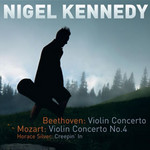
Violin Concerto (with Mozart-Violin Concerto No 4)
 $36.00
Special Order
$36.00
Special Order3 - 6 weeks add to cart
BEETHOVEN
Violin Concerto (with Mozart-Violin Concerto No 4)
Nigel Kennedy (violin & conductor) / Polish Chamber Orchestra
[ EMI Classics / CD ]
Release Date: Wednesday 4 June 2008
This item is only available to us via Special Order. We should be able to get it to you in 3 - 6 weeks from when you order it.
Fifteen years after recording the Beethoven Violin Concerto with the late great Klaus Tennstedt (1992), Nigel Kennedy has recorded a new version with the Polish Chamber Orchestra, directing the ensemble from the violin.
The coupling is Kennedy's first ever recording of a Mozart violin concerto: No 4, K218. Both works share the key of D Major.
The CD includes an encore, Kennedy's own arrangement of Creepin in, by the hard bop legend Horace Silver.
"Kennedy is the best embodiment of the fact that music is music. To every sphere of his work he brings his same, instantly recognizable style." (Gramophone)
Kennedy explains his motivation for re-approaching the Beethoven concerto after fifteen years: "I now have a totally different interpretation of the concerto." While still cherishing his best-selling first version with Klaus Tennstedt and the NDR Orchestra, which was "in the old-fashioned, romantic kind of vein - quite slow, passionate but with a lot of expanse. The way I hear it now is very rhythmic. It's got to have some rhythmic vitality as well as the beautiful lines….rhythm has become an important factor in the way that I see music, maybe not only because of my jazz playing but because I think one's heartbeat is where the rhythm begins. All of life is about rhythm." This time around, Kennedy performs his own modified version of Fritz Kreisler's cadenza to the first movement and he composed his own cadenzas for the other two movements.
Kennedy has not performed Mozart for more than twenty-five years. "People have been trying to pair Mozart and me for a long time," he says. "I've called my son after him - his third name is Amadeus - in the hope that one day I'd grow to love Mozart. And finally, it's happened! It's my love of Beethoven, and finding a way of playing [the Beethoven Concerto], which related to the way of playing Mozart, that led to me making this album of Mozart and Beethoven together."
For the Mozart Concerto in D Major, K218, Kennedy has incorporated jazz and other non-classical styles in radical cadenzas that keep the composer's material in mind yet give the work a contemporary edge. Recorded with his electric violin and Michal Baranski on double bass, he expresses what the concerto means to him personally and hopes they will open listeners' minds and hearts to the piece. He has also introduced a harpsichord, which adds warmth and gives the concerto even more life. "What really drives all of my interpretations … is how and that it belongs in today's time," he says. "I've been doing jazz sets recently in the Blue Note Club in Tokyo and playing the last movement of Bartók's solo sonata there. That music can belong in today's time, if you present it in the right way and play it in the right way. The same with Mozart for me - it can belong today. Otherwise, why not bury these guys and have done with it?"
Commenting on the performances, recording producer David Groves said, "The whole driving force in the music-making is the relationship between Nigel and the orchestra." Alain Lanceron, EMI Classics Vice President A&R, added that playing without a conductor is a plus. "The experience is more chamber-music-like and Nigel can play ping-pong with the other instruments of the orchestra." Kennedy himself likens the direct communication between himself and the orchestra, and amongst the orchestra members themselves, to being like "a big jazz band or a small quartet. … You don't need someone making visual signs to make it happen and luckily I didn't have to do too much to make it happen either. I was able to play the way I would want to play, having had the experience with my colleagues that we all knew we were playing together. … There is an automatic respect between us all which enabled me not to have to devote too much time away from communicating the music."
For over twenty-five years, Nigel Kennedy has been acknowledged as one of the world's leading violinists. With his virtuosic technique, mass appeal, unique talent and natural ability to communicate with his audience, he has brought fresh perspectives to both classical and contemporary repertoire, winning critical acclaim and huge popularity among a broad-based audience and, by far, remains the best selling international classical violinist of all time. Nigel Kennedy will perform this repertoire on international tours throughout 2008 and 2009.
![The Four Seasons [20th Anniversary Luxury Edition] cover](https://images.marbecks.co.nz/_thumbnails/10159/10159755.jpg)